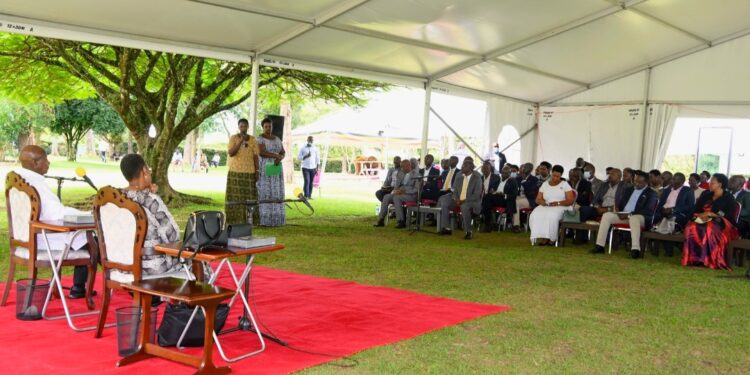President Yoweri Museveni has charged leaders at every echelon with advocating for household income generation to empower communities. At his Kisozi farm, President Museveni, alongside the First Lady and Minister of Education and Sports, Maama Janet Kataha Museveni, hosted a delegation of exemplary farmers from nine villages spanning Gomba and Sembabule Districts. In this gathering, he underscored the paramount importance of prioritizing household income as a driving force for community development.
During the meeting convened on Tuesday, April 2, President Museveni accentuated the pivotal role of leaders in fostering prosperity at the grassroots level, spotlighting the achievements of the Greater Kisozi Model Villages project launched in 2011.
“People should work for sustenance and prosperity alike, focusing on economic growth through initiatives like ‘ekibaro’. This has been our clarion call since the 1960s. It’s perplexing why infrastructure like roads and electricity garners more attention from leaders, neglecting the fundamental aspect of household income. We can have impeccable infrastructure, yet poverty persists. Conversely, we can foster wealth despite lacking infrastructure,” remarked President Museveni.
In 2011, President Museveni initiated a transformative effort by providing livestock, agricultural inputs, and monetary aid to households across nine villages in Gomba and Sembabule. This endeavor aimed to combat poverty and catalyze income generation to uplift livelihoods.
Reflecting on his decades-long crusade to foster prosperity, the President recounted his pioneering strategies dating back to the 1960s, when he spearheaded anti-poverty campaigns in the Ankole region. His vision centered on empowering communities through modern farming techniques and entrepreneurship.
President Museveni recalled advising farmers in the cattle corridor to transition from nomadic practices to settled farming, advocating for dairy farming and sustainable land management.
“The Ankole people embraced my message of wealth creation,” affirmed President Museveni, citing the successful transformation of the region’s economy.
Despite challenges in the 1990s, characterized by widespread poverty and limited opportunities, President Museveni’s unwavering commitment led to initiatives such as livestock provision and agricultural support, catalyzing economic progress.
President Museveni reiterated his support for project beneficiaries, pledging continued resources to sustain progress. “We will augment resources for the project,” he affirmed, emphasizing the government’s steadfast dedication to fostering inclusive growth.
Furthermore, President Museveni urged farmers to adopt the four-acre model of farming, advocating for diversified agricultural practices to maximize productivity and income generation.
On the sidelines, Sarah Nalwanga, the Project Coordinator, commended the scheme’s impact, citing notable improvements in household assets and agricultural productivity. To date, the project has benefited 2,035 households, focusing on home improvement, food security, income-generating activities, value addition, and SACCO support.
Members of Parliament from Gomba and Sembabule Districts expressed gratitude for President Museveni’s visionary leadership, pledging to mobilize communities to embrace poverty-alleviation programs.
Beneficiaries of the project shared their success stories, highlighting the transformative impact on their lives. James Kalanda, once struggling to make ends meet, now thrives as a mango farmer, while Josephine Namusisi and George Ssabagabo recounted their journeys from poverty to prosperity, all attributing their success to President Museveni’s initiatives.






